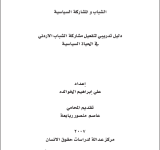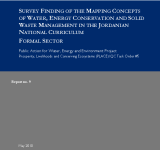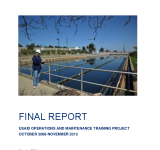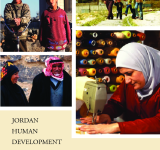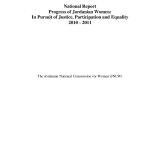principles
The study aims to evaluate the concepts of water;; energy and solid waste that exists in the curriculum and the manner in which they are tackled by mapping the current textbooks based the three themes of the study – water;; energy and solid waste. The report is based on a comprehensive study of 104 school textbooks from grades 1 – 10 in fourteen subjects. The survey finds that the environmental education concepts were vastly covered in all subjects of he study in a total of 1777 concepts;; and most of them focused on scientific facts and information with repetitive energy concepts and lack of sequential flow. This research was conducted as part of the Public Action for Water;; Energy and Environment Project (PAP);; which aims to encourage water and energy conservation and to support behavior change towards more conservation and efficient practices both at the household level and in the commercial;; industrial and civil society arenas using social marketing behavioral methods. Based on the finding that there is little space allocated to the synthesis and application of information and knowledge and therefore the concepts remain superficially tackled;; the report recommends that support material should be prepared for the different grade levels and training programs should be developed for the teachers as real agent of change and role models.
The final report is a product of the USAID/ Jordan's 55-month Operations and Maintenance Training (OMT) Program that enhances workers and organizational performance in water infrastructure. The report includes the OMT Program's executive summary;; key accomplishments and lessons learned and recommended actions;; and it also identifies some the contexts;; challenges;; methodology and results and impacts of improving the operator standards and performance. According to the report;; the OMT exceeded its expectations and achieved all results in regards to the number of certified operators;; managers;; trainers;; developers;; and coaches graduated;; certified programs;; courses and tests developed;; training sessions conducted;; and legal measures and institutional actions enacted. The report identifies hat the dedicated and hands-on support of OMT's primary partners was a key factor in achieving the OMT target results. The program also expects the structure of the Jordan program will be responsive to changing needs and the progressive development of training capacity within the Jordanian water sector. Following the OMT's completion;; the players in the Jordanian program will continue to build their capacities and move to the next state in their institutional arrangement.
This report consists of eight chapters and aims to summarise the key concepts of human development. It introduces the Human Development Index;; provides an overview of Jordan's human development achievements;; examines the regional vulnerability context that has constrained Jordan's options in its pursuit of social and economic development;; provides a platform for the poor to express their views and perceptions in relation to their poverty status;; reviews the policies;; institutions and processes that affect the poor;; examines the government's attempts to stimulate entrepreneurialism;; promotes the application of a rights-based approach;; in which all citizen are equally empowered and have the capacity and the appropriate enabling environment that allows them to claim their entitlements according to law. Finally;; the study examines the various reform initiatives in progress and assesses the extent to which Jordan is committed to the process.
This national report is designed to trace the progress of women in various fields;; monitoring achievements;; and highlighting gaps and failures;; as well as analyzing indicators;; recommending measures;; and measuring levels of achievements in the implementation of plans and strategies. The main themes were selected according to national priorities dictated by each stage: Legal Protection for Women's Right to Access Justice;; Participation;; the Economic Empowerment of Jordanian Women;; Equality;; Citizenship and Decision-Making in Public Life. The conclusions of this report confirm that a much smaller effort was exerted at the level of providing information;; data and the provision of services in the area of providing justice and facilitating ways of achieving it. The lack of knowledge about available services among women;; whether provided by civil society organizations or government institutions;; affects women's ability to access justice negatively. Regarding the economic participation the Policies and plans that targeted empowering women economically show that the result of these policies was weak and limited. Difficulty of women’s access to job opportunities in the private sector and inequitable pay between the sexes;; lack of supporting services to working women;; including childcare Facilities;; poor matching between education outputs and skills required in the labor market and the traditional social standards that contribute to directing females towards certain professions. The report proposed general recommendations and directions that include quick solutions to deal with the main highlighted challenges.

